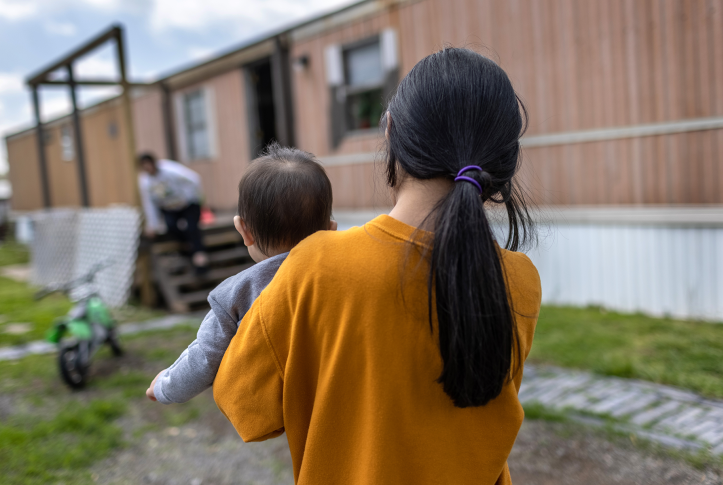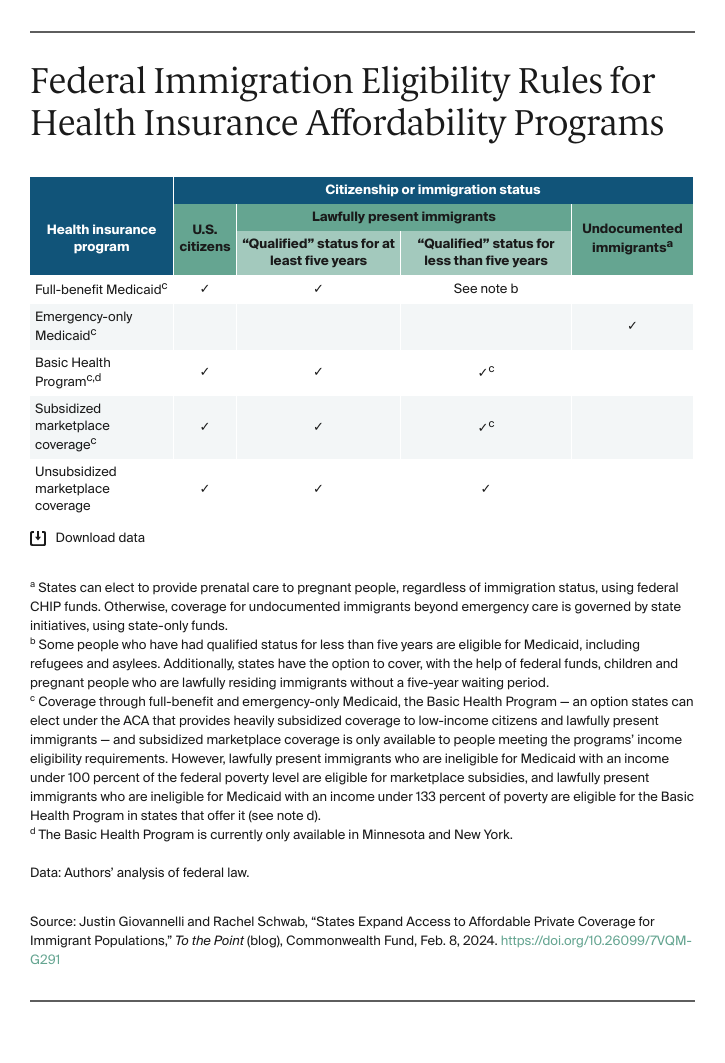At the same time, Trump administration immigration policies appear to have had a chilling effect on many immigrants’ use of government services — including health coverage for which they were eligible — and have discouraged take-up even after those policies were reversed. Partly for these reasons, immigrant populations (including those lawfully present and undocumented) are far more likely to be uninsured than their U.S.-born neighbors.
Undocumented Immigrants Face Unique Coverage Barriers
Undocumented immigrants have limited health insurance options. While lawfully present immigrants — including those in the five-year Medicaid waiting period — can access coverage and income-based subsidies through the ACA marketplaces, undocumented immigrants are ineligible for federal coverage subsidies and can’t even use the marketplaces to enroll in unsubsidized coverage. And despite the high share of undocumented immigrants with lower incomes, this population is essentially cut off from Medicaid. Absent access to employer-sponsored insurance, undocumented residents’ only option for a comprehensive health plan has been unsubsidized private coverage available outside of the marketplace — often at a prohibitively expensive price.
States have filled some of the gaps by using state dollars to extend Medicaid benefits to specific populations (such as children) without a legally recognized immigration status, or by providing a narrower set of benefits to such groups. Two states — California and Oregon — have gone further, funding full Medicaid benefits for all low-income residents who otherwise would be eligible for the program but for their immigration status. Still, until recently, no state had addressed the affordability of comprehensive coverage for the many undocumented individuals just above the Medicaid income-eligibility threshold.
Improving Access for All Residents
For 2024, Colorado and Washington have made private coverage more affordable for undocumented immigrants via state-funded subsidy programs. Both initiatives are part of a larger set of state reforms, including expanded subsidies for citizens and lawfully present immigrants as well as public option–style programs, intended to help all residents access affordable quality coverage.
Colorado’s program, OmniSalud, is entering its second year of operation. Undocumented immigrants apply for health insurance through Colorado Connect, a state-run shopping platform separate from the state’s ACA marketplace. Accompanying state subsidies significantly reduce the cost of coverage, but availability is limited. In 2023, funding enabled 10,000 undocumented Coloradans with incomes up to 150 percent of the federal poverty level ($20,385 for an individual, $41,625 for a family of four that year) to enroll in a plan with no monthly premium and substantial cost-sharing assistance; in 2024, the state is funding financial assistance for up to 11,000 people. Demand has been high: 2024 subsidized enrollment reached the 11,000-person cap in the first two days of open enrollment. Undocumented Coloradans enrolling through OmniSalud after that date could still get coverage but must pay full price for a 2024 plan.
Washington State’s initiative for undocumented individuals is new for 2024. The state secured a federal 1332 waiver permitting undocumented immigrants to enroll directly via its ACA marketplace, Washington Healthplanfinder. However, the waiver does not (and could not, under federal law) allow undocumented residents to receive federal marketplace subsidies. To make plans more affordable, the state is providing up to $250 per month in premium assistance for enrollees with incomes up to 250 percent of poverty ($36,450 for an individual, $75,000 for a family of four). Though Washington’s funding is also limited, the state has not established a cap on subsidized enrollment.
Minnesota and New York are using their own funds to expand access via related coverage programs. Both states currently operate a Basic Health Program (BHP) — MinnesotaCare and the Essential Plan, respectively — an optional program created by the ACA that provides heavily subsidized coverage to citizens and lawfully present immigrants with incomes between 133 percent and 200 percent of poverty. BHP coverage is supported in large part by federal funds, for which undocumented immigrants are ineligible. Since 2017, Minnesota has used state dollars to extend eligibility to income-eligible Deferred Action for Childhood Arrivals recipients. New York intends to do the same with its Essential Plan later this year.1 In 2025, Minnesota will use additional state funds to expand MinnesotaCare to more undocumented residents.
Looking Forward
A small but growing number of states have stepped up to make coverage more affordable for undocumented immigrants, a population consistently left out of major federal coverage expansions. The reach of these efforts is mostly modest relative to need, and a comprehensive solution to the 50 percent uninsured rate among undocumented adults, like other problems tied to federal immigration policy, surely will require changes in federal law. Until then, states interested in pursuing programs can help undocumented populations obtain comprehensive, affordable health insurance.



